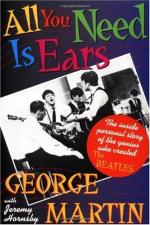
|
| Name: _________________________ | Period: ___________________ |
This test consists of 15 multiple choice questions and 5 short answer questions.
Multiple Choice Questions
1. Which Beatle, according to George Martin in Chapter 7, was the most proficient musician?
(a) Ringo Starr.
(b) Paul McCartney.
(c) George Harrison.
(d) John Lennon.
2. At Abbey Road, what skills did George Martin realize were required to make recordings, in addition to technical abilities?
(a) Promotion and public relations.
(b) Diplomatic skills and tact.
(c) Accounting.
(d) Carpentry.
3. During his first meeting with George Martin, the Beatles' manager said that everyone in Liverpool described them in what way?
(a) The bee's knees.
(b) The cat's pajamas.
(c) The best thing since sliced bread.
(d) Twenty-three skidoo.
4. "Love Me Do" hit what number in the charts?
(a) Twenty.
(b) Five.
(c) Seventeen.
(d) One.
5. What reason did George Martin offer, in Chapter 1, for marrying his first wife, Sheena?
(a) Rebellion against his mother.
(b) Young love.
(c) Her singing voice.
(d) Her family's wealth.
6. After hearing the Beatles play for the first time live, George Martin wanted to replace which musician?
(a) The bass player.
(b) The vocalist.
(c) The drummer.
(d) The lead guitarist.
7. According to George Martin in Chapter 7, Ringo Starr's lack of technical skill was made up for by what?
(a) The sweet voice of Paul McCartney.
(b) Solid technique and individuality.
(c) Charisma.
(d) The rough voice of John Lennon.
8. George Martin guesses he was how old when his family got a piano?
(a) Three.
(b) Six.
(c) Nine.
(d) Twelve.
9. Who first contacted George Martin in 1962 about a new group called the Beatles, as described in Chapter 7?
(a) Sid Coleman.
(b) Brian Epstein.
(c) Dr. Karl Haas.
(d) Judy Lockhart-Smith.
10. Who were the four Beatles who first met with George Martin in 1962?
(a) Brian Epstein, John Lennon, George Harrison, and Pete Best.
(b) John Lennon, Paul McCartney, George Harrison, and Pete Best.
(c) John Lennon, Ringo Starr, Brian Epstein, and Pete Best.
(d) Paul McCartney, George Harrison, Pete Best, and Ringo Starr.
11. The composer Bach trudged hundreds of miles in a failed attempt to meet which other musician, according to George Martin in Chapter 2?
(a) Debussy.
(b) Chopin.
(c) Handel.
(d) Beethoven.
12. On what date did the Beatles gather to record their first record?
(a) September 11, 1962.
(b) July 9, 1961.
(c) July 22, 1962.
(d) August 12, 1963.
13. Which Beatles song was the first to reach number one in America?
(a) "I Want to Hold Your Hand".
(b) "Yesterday".
(c) "She Loves You".
(d) "Ticket to Ride".
14. Early in Chapter 1, when the Beatles stood up George Martin, where did he find them?
(a) The Hotel Georges Cinq.
(b) The Hotel Georges Deux.
(c) The Hotel Jacques Cinq.
(d) The Hotel Jacques Trois.
15. What is the length of the tubing in a French horn?
(a) Sixteen feet.
(b) Twenty-six feet.
(c) Ten feet.
(d) Twelve feet.
Short Answer Questions
1. Whom does George Martin refer to as his fairy godfather?
2. Who was the head of Parlophone, whom George Martin met for an interview at the beginning of Chapter 3?
3. What was the scandal at EMI, involving sopranos Kirsten Flagstad and Elisabeth Schwarzkopf?
4. Unbeknownst to George Martin, the Beatles wanted to replace one of their musicians with what new man?
5. Who was the manager of the Beatles in 1962?
|
This section contains 553 words (approx. 2 pages at 300 words per page) |

|




